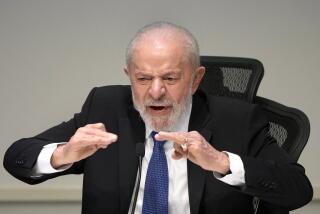Democracy Whets the Hunger for Power
- Share via
MEXICO CITY — It would be absurd to blame all of Mexico’s travails on the supposed reelection ambitions of former President Carlos Salinas de Gortari, particularly when there are so many other apparent causes for the country’s economic collapse, political violence and breakdown of law enforcement. But many savvy Mexican politicians are convinced that Salinas hoped for a second term, and the idea has some plausibility in light of the trend taking hold elsewhere in Latin America. Many in Mexico believe that back in 1992, Salinas tried to amend the constitution, which since 1928 has forbidden more than one term for Mexican presidents. When that failed, the theorists say, Salinas chose Luis Donaldo Colosio to be the PRI presidential candidate; once in office, Colosio would change the constitution, allowing Salinas to return to the presidency in 1998. When Colosio was assasinated (the scenario continues), Salinas put forward Ernesto Zedillo because by then he knew that the economy was headed for a major crisis and his successor’s inexperience would force Mexicans to call him back to power.
Devastating as the consequences for Mexico were--and still are--Salinas would not have been alone in trying to extend his mandate. In Peru, Alberto Fujimori got Congress to modify the constitution in 1994, ran for reelection in 1995, won, and has just reamended the law so that he can be reelected again in the year 2000. If everything works out, Fujimori could conceivably remain in office “democratically” until 2005--that’s 15 years, more than enjoyed by most of the dictators that inhabit the great works of Latin American literature.
In Argentina, Carlos Menem persuaded most of the opposition to support his attempt to change the constitution in 1994 and subsequently was reelected. Now Brazil’s President Fernando Henrique Cardoso has instructed his coalition’s members of Congress to press forward with a constitutional amendment that will allow him to run for reelection in 1999.
This reelection craze flies in the face of Latin American tradition; none of the democratic countries in the region allowed reelection previously, and most still do not--Colombia and Costa Rica not at all, and Venezuela and Uruguay only after several terms have passed. Yet, on the surface, the arguments for presidential reelection don’t seem all that unreasonable. Incumbents assert that they need more time to carry out their “reform” programs: democratization, privatization, deregulation, trade openings and so on. Four or five years is simply not enough. Also, it is argued, now that democracy has been firmly rooted in the region, there is no good reason to forbid reelection; after all, opposition candidates can challenge the incumbent and the people can vote him out. What’s the problem?
What, indeed? Could it be significant that friends and fans in the international financial community and in Washington strongly support the free-marketeers’ remaining in office?
In practice, however, there seems to be a reelection jinx in Latin America. In Peru, the Shining Path guerrilla movement is on the upswing again, the economy has stagnated and allegations of corruption and drug-trafficking against Fujimori’s closest advisors have shaken his government. In Argentina, having fired his finance minister, Menem seems adrift as the economy refuses to shake off the 1995 recession, the opposition unites and his approval rating sinks to an all-time low of 19%; no one understands how the country can muddle through the 3 1/2 years left of Menem’s tired tutelage. And in Brazil, while Cardoso remains personally popular, polls show a majority opposed to the reelection amendment, as are many of his former allies.
Therein lies the heart of the question. Latin American societies, in their intuitive wisdom, might just be stating that not enough time has passed since the authoritarian nightmares of years gone by, that democracy has not yet been sufficiently consolidated in the region. Electorates vote one way, then regret their decision and rebel against the reality. It may be that in a region where rulers historically have seemed to remain in power forever, and where incumbency is known to confer enormous advantage, the time is not ripe for even the most impeccable democrats, such as Cardoso, to overstay their welcome. Remember, time moves more slowly south of the Rio Grande.
More to Read
Sign up for Essential California
The most important California stories and recommendations in your inbox every morning.
You may occasionally receive promotional content from the Los Angeles Times.










